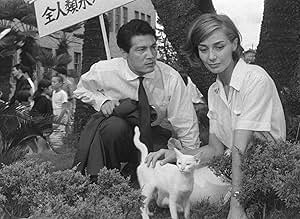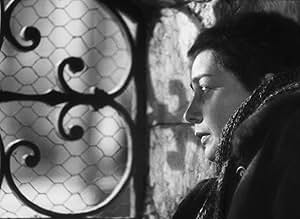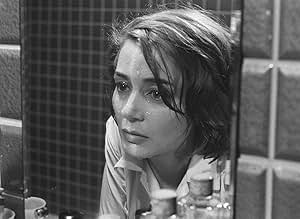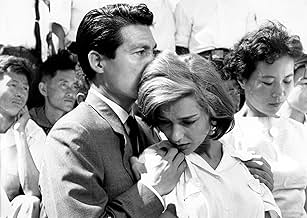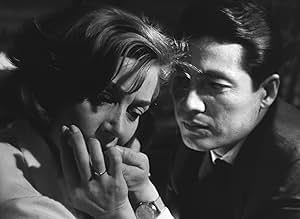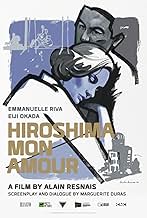Hiroshima mon amour
- 1959
- Tous publics
- 1h 30m
IMDb RATING
7.8/10
38K
YOUR RATING
A French actress filming an anti-war film in Hiroshima has an affair with a married Japanese architect as they share their differing perspectives on war.A French actress filming an anti-war film in Hiroshima has an affair with a married Japanese architect as they share their differing perspectives on war.A French actress filming an anti-war film in Hiroshima has an affair with a married Japanese architect as they share their differing perspectives on war.
- Nominated for 1 Oscar
- 7 wins & 7 nominations total
Featured reviews
This is surely one of the most impressive movies i know. It is also a very impressive portrait of a woman. Don't expect to see an ordinary love story -it is as not so much a love story as a story of a wounded person meeting a wounded city. A story about two people hurt by peace. Even though it is over more than four decennia old it feels surprisingly new. The reason for this must be the beautiful photography -starting with the very first shots of the two lovers- and the deliberate moving away from conventional script writing by Marguerite Dumas. The movie has the feel of an opera, with the music of Georges Delerue as a moving force. I thought it was enchanting, and it stayed with me for days after.
Memory has persistently troubled filmmakers, this facet of consciousness by which the past overwrites the present. Where do these images come from, at what behest? More importantly, by invoking memory, how can we hope to communicate to others this past experience, which only perhaps existed once?
The woman says she saw Hiroshima, the charred asphalt and scorched metal, the matted hair coming out in tufts. We may have seen the same anonymous images of disaster, elsewhere, and think we saw. We see other people like her, like ourselves as mere spectators of a film, walk around the a-bomb museum in Hiroshima among the relics of disaster, lost in thought, impotent to reconstruct the experience from these glassed remnants of it. One of the great metaphors of memory, this museum that houses and presents fragmentary what used to be and how the spectators merely move inside it—internal observers of images.
The woman says she saw Hiroshima, but we know she didn't really experience. We know by the same images we may have seen, and which we see again in the film. We know this from our own private efforts to relive time gone. We see the objects and sounds but not having walked among them, we only know them vicariously. Can we ever get to know through cinema for that matter?
The great contribution of Resnais to cinema is firstly this, the realization that this medium is inherently equipped to inherit the problem of memory—just what is this illusory space. Inherently equipped in the same breath to fail to recapture the world as it was, like memory. Where Godard would be in thirty years, Resnais—and his friend Chris Marker—already was with his debut. He gives us here a more poignant, intelligent disclaimer of the artificiality of cinema than Godard ever did. The woman is of course an actress starring in a film—about peace we find out.
But Hiroshima is not the simple ploy of a trickster, it enters beyond.
We see in Hiroshima how the past forms that make up life as we have known it, and in which the self was forged, come into play. How these things, a past love or suffering thought to matter at the time, are only small by the distance of time. That we weren't shattered by them.
And we see how, having been, these forms will vanish again. How this present love and perhaps the suffering that will follow it, thought to matter now, will also come to pass and be forgotten. How we will perhaps try to recount these events at a future time, our reconstructions faced with the same impotence to make ourselves known or know in turn.
All that remains then, having walked the city in an effort to shape again from memory, is this moment, perhaps shared by two people on a bed. These walks taken together. Perhaps a story to tell or a film about it.
Something to meditate upon.
The woman says she saw Hiroshima, the charred asphalt and scorched metal, the matted hair coming out in tufts. We may have seen the same anonymous images of disaster, elsewhere, and think we saw. We see other people like her, like ourselves as mere spectators of a film, walk around the a-bomb museum in Hiroshima among the relics of disaster, lost in thought, impotent to reconstruct the experience from these glassed remnants of it. One of the great metaphors of memory, this museum that houses and presents fragmentary what used to be and how the spectators merely move inside it—internal observers of images.
The woman says she saw Hiroshima, but we know she didn't really experience. We know by the same images we may have seen, and which we see again in the film. We know this from our own private efforts to relive time gone. We see the objects and sounds but not having walked among them, we only know them vicariously. Can we ever get to know through cinema for that matter?
The great contribution of Resnais to cinema is firstly this, the realization that this medium is inherently equipped to inherit the problem of memory—just what is this illusory space. Inherently equipped in the same breath to fail to recapture the world as it was, like memory. Where Godard would be in thirty years, Resnais—and his friend Chris Marker—already was with his debut. He gives us here a more poignant, intelligent disclaimer of the artificiality of cinema than Godard ever did. The woman is of course an actress starring in a film—about peace we find out.
But Hiroshima is not the simple ploy of a trickster, it enters beyond.
We see in Hiroshima how the past forms that make up life as we have known it, and in which the self was forged, come into play. How these things, a past love or suffering thought to matter at the time, are only small by the distance of time. That we weren't shattered by them.
And we see how, having been, these forms will vanish again. How this present love and perhaps the suffering that will follow it, thought to matter now, will also come to pass and be forgotten. How we will perhaps try to recount these events at a future time, our reconstructions faced with the same impotence to make ourselves known or know in turn.
All that remains then, having walked the city in an effort to shape again from memory, is this moment, perhaps shared by two people on a bed. These walks taken together. Perhaps a story to tell or a film about it.
Something to meditate upon.
10Hitchcoc
As a college freshman some 45 years ago, I saw this film in the student union They had a commitment to art films. I have to say that I do remember the stream of dialog between the two characters but little about the content. I knew he (the Japanese man) had lost his family on that August day. I recall her pulling inward as he becomes a bit demanding. Watching it with mature eyes and a fresh view of the world, I was brought back to these two traumatized characters and the war that changed them forever. It begins with a discussion of the Hiroshima museum which contains pictures and artifacts from that fateful day. He keeps telling her that she has not seen Hiroshima as they lay entwined in bed. His pain is more predictable. He lost his family that day while he was away. Hers takes a more melancholy road. As she opens up, she tells the story of a love affair with a German soldier whom she would meet in all manner of places. One day she found him dying, curled up on the ground. She sits with him until he dies. New of their trysts gets out and she is ostracized by her community, her hair cropped, beaten, and thrown in a cellar by her own family. She has not told this story to anyone, including her own husband, until now. While she feels somewhat liberated the pain is too deep. The Japanese man, also married, wants her to stay in Hiroshima. The movie is about the relationship going forward with such damaged people. She repeatedly tries to escape him, but he keeps resurfacing. The sad thing is that she desires him and so it's not as if she is being stalked. Resnais is a master with the camera, using black and white contrasting images, engaging flashbacks, close-ups. One really marvelous scene is where the young woman, who has been playing a small part in an anti-war film, is nearly trampled by protesters carrying signs. Hiroshima is constantly in her face. She has been hurt so badly by the war and is carrying a load of guilt. War carries with it a loss of innocence and pain beyond the obvious. This film really captures this.
10RunPepe
This film has been compared to "Citizen Kane," not because of the story itself, but the way it is told, and through innovative artistic devices. The screenplay is highly poetic even when describing destruction, death, and madness. Several jump cuts in time occur with voice-over, and, at the beginning, voice-over during a montage of frightening images from the aftermath of the Hiroshima bombing and the bodies of the two lovers in bed. The characters represent different cities; the Japanese man, Hiroshima, the French woman, a city in France, Nevers (was this intentional?), but the latter might as well represent any outside nation. While "Hiroshima," even after being destroyed by an "ally" of France, falls in love with her and wants her to stay, despite his claims that she can never know what the bombing was really like, yet leaving this in the past without forgetting, "France" is hung up on a dead Nazi soldier whom she had loved, and became an outcast because of it. What the soldier really seems to represent is not the Nazis, but rather a real, true love that transcended nationalities and associations. France's past is personal and fears forgetting it, while Hiroshima's is communal and, while not wanting to forget, also wants to move ahead. For this reason Hiroshima keeps trying to convince France to stay so that they can be in love, but France is too preoccupied with its own personal ghost that it cannot share, which is why it is a major breakthrough for her when she tells her tragic story for the first time to anyone, Hiroshima. Hiroshima's past tragedy being communal is shared and it wants to share with the rest of the world. France's tragedy is personal and is only beginning to be shared. It takes the entire film before the two characters can get to a beginning of something more than their differences and likenesses of tragedy and loss in the past, and this beginning is who they really are, in the present, two people reborn from these tragedies.
"Hiroshima mon amour" (1959) is an extraordinary tale of two people, a French actress and a Japanese architect - a survivor of the blast at Hiroshima. They meet in Hiroshima fifteen years after August 6, 1945 and become lovers when she came there to working on an antiwar film. They both are hunted by the memories of war and what it does to human's lives and souls. Together they live their tragic past and uncertain present in a complex series of fantasies and nightmares, flashes of memory and persistence of it. The black-and-white images by Sasha Vierney and Mikio Takhashi, especially the opening montage of bodies intertwined are unforgettable and the power of subject matter is undeniable. My only problem is the film's Oscar nominated screenplay. It works perfectly for the most of the film but then it begins to move in circles making the last 20 minutes or so go on forever.
Did you know
- TriviaThis film pioneered the use of jump cutting to and from a flashback, and of very brief flashbacks to suggest obtrusive memories.
- GoofsWhen Elle leaves the hotel to go the set, she is wearing a nurse's uniform with a headscarf and carrying a black handbag. When Lui meets her on the set, she is now wearing a skirt and blouse and still has the headscarf. When they leave the set, the headscarf is left behind. When they get to Lui's house, she now has a white jacket.
- ConnectionsEdited into Histoire(s) du cinéma: Le contrôle de l'univers (1999)
- How long is Hiroshima Mon Amour?Powered by Alexa
Details
- Release date
- Countries of origin
- Languages
- Also known as
- Hiroshima Mon Amour
- Filming locations
- Nevers, Nièvre, France(street scenes, river banks)
- Production companies
- See more company credits at IMDbPro
Box office
- Gross US & Canada
- $96,439
- Opening weekend US & Canada
- $18,494
- Oct 19, 2014
- Gross worldwide
- $139,947
- Runtime
- 1h 30m(90 min)
- Color
- Sound mix
- Aspect ratio
- 1.37 : 1
Contribute to this page
Suggest an edit or add missing content



